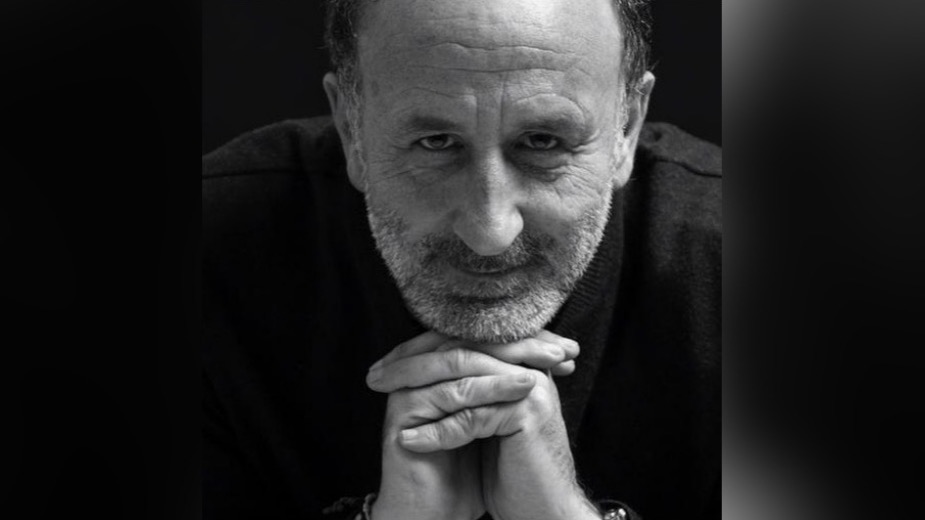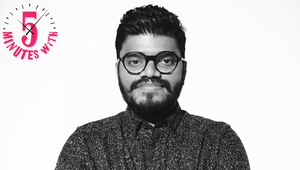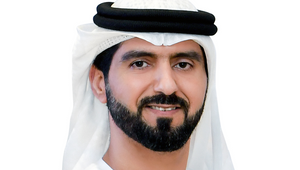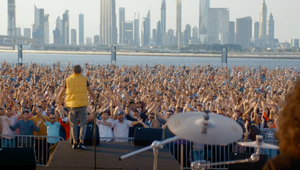
Malek Ghorayeb: We Cultivate the Cult of the Idea

BIG KAHUNA FILMS, the award-winning creative production house based in Dubai and Beirut is proud to support creativity across the Middle East. Over the coming months, as part of their sponsorship of LBB’s United Arab Emirates, Lebanon and Kingdom of Saudi Arabia editions, they are supporting in-depth interviews with creative leaders in the region.
Leo Burnett Beirut is an agency that has long been rich in talent and high in ambition. Looking back to bold, contextual Johnnie Walker work to confronting and law-changing work on child marriage, the agency is an exemplar of Lebanese creativity: fearless, passionate and fuelled by the lively, pioneering art, music and fashion scenes of Beirut.
Malek Ghorayeb is the executive regional creative director, looking after the Levant and also the agency’s global work for P&G. He’s a lifelong Burnetter and immensely proud of his team, particularly as they’ve rallied during a particularly challenging year for the city. The agency has had something to shout about though – they took home the Grand Prix for Good at the recent Dubai Lynx awards for its unrelenting, visceral gender equality film Baklava Got Legs.
LBB’s caught up with Malek to talk about creativity in the country and across the Middle East, to find out why the region is no longer sitting in a silo and has found its voice.
LBB> How did you end up in that position?
Malek> I started in advertising 23 years ago in Paris, where I grew up. Actually, I started on the client servicing side. I had a friend Bechara Mouzannar who used to be our CCO. I met him in the street, and he said he was taking over and would I like to come.? He said, “I want you to go on the other side of the corridor and build the creative department”. And this is what happened. Six months later I resigned and joined Leo Burnett in Beirut as a copywriter at that time.
Through time I became the creative director. They moved me around; I became the creative director of the Saudi office, and then Dubai and then back to Beirut. My function, if you like, is I’m the CCO of the Levant region plus Qatar. We are one of the three main global hubs for P&G. For years I was the global creative director on Fabric Care – this function does not exist anymore, but we are still one of the main global hubs for detergent and a lot of small brands. We have 75 people servicing P&G out of Beirut.
Certainly, it opens your mind. Whenever you always work on the same kind of market, the same kind of jokes come back. But when you have to apply this joke to a totally different culture and you realise it’s not working in their eyes, you have to be more creative to make sure that whatever universal insight that you’re tackling works there.
LBB> Lebanon seems to produce so much creative talent that travels across the MENA region and the world. Where do you think this comes from?
Malek> It may be because of the openness of the country over the years and the fact that we speak three languages from school. Maybe it’s also our Phoenician background, we have this energy of discovering things and we were the people that opened the Middle East market in the ‘40s. Maybe this is also why we’re pretty much entrenched there.
And the good universities are in Beirut. It’s multi-cultured and that helps a lot. For years we were considered to be just a region, and suddenly we started competing with all the big names and being on stage at all the big awards ceremonies. Now they all look at us thinking, maybe we need to be careful about these guys arriving. To be fair, all the big names and small names in the region are doing good work, of international standard, that we can be proud of. Work that goes out from the Middle East, from Dubai, Saudi, Beirut.
LBB> And Leo Burnett, particularly, has nurtured all sorts of creative talents, including some of the country’s big directors.
Malek> We cultivate – and this has mainly been led by Burnett but other agencies – the cult of the idea and our creatives are multi-tasking creatives. Our art director or copywriter does a lot of things. We do everything, we don’t have money, so we better have a good idea that can be applied in an integrated way, everywhere, and make sense regardless of the channel.
LBB> And to what do you attribute the increased standing of the Middle East on the international advertising stage?
Malek> We finally found our style. For years we were trying to be like Europe. If you look at what the Egyptians are doing with their TVCs and their humour it is very spot on. It may be very Arabic- or Egypt-centric but it’s spot-on and it works. This is also why we’ve also attracted a lot of international talent.
The arrival of innovation five years ago changed the industry. But I think what we are still fighting for is to put technology and innovation at the service of the idea and not just finding the innovation and technology and asking, ok what do we do?
LBB> Lebanon has a really thriving arts scene too. How does that feed into advertising – especially compared to other countries in the region?
Malek> It was always the creative hub when it came to the underground scene, regardless of what scene we’re talking about, whether it’s music, fashion or the arts, painting. We have this culture, and we know how to export it. Egypt also realises that they also have it and are using it now more and more.
Funnily enough, the new openness and new way of doing things in Saudi is bringing more local boys and girls. They’re bringing this arty scene to project an image. The UAE is a totally different beast because it’s a new country that was, in a way, built by foreigners so it’s going to take time to have the real local scene emerging. Whatever comes out of Dubai always looks very slick and grandiose because this is the image that the UAE and Dubai wants to project also.
If you look at what’s happening in the online content front in Saudi, they are prolific in terms of ideas generation and new tricks and what they are creating is incredible. All these young guys and, funnily enough, young girls are creating these small shows; stand-up comedians are cracking jokes that were totally unacceptable five years ago. Today it’s done by them, for them, with jokes that only they can understand, with the real Saudi slang. It’s great to see this emerging pool of talent taking over. Really I applaud it.
LBB> The agency recently won a Grand Prix at the Dubai Lynx for its punchy film Baklava – and indeed Leo Burnett is the only agency to win a Glass Lion three years in a row. Why is sex inequality and work related to the status of women so important and fearless in Beirut?
Malek> Out of seven creative directors in Beirut, I have only one boy. All the rest are very talented women. Lebanon is pretty much an open country but if you dig a little bit in the laws, women are like second class citizens. I have life and death options on my wife and on my sister – which is crazy in the 21st century. Within the agency, the women became activists at heart, defending their rights. And if you look at the work they do on gender with NGOs you can feel the passion.
It's done because we need to do the work for the nation. About 10% of the population is educated, so we need to say to the rest of the population that we’re here and that we’re trying to find a solution, we’re all in the same shit. If you think of it, with my creative director Natasha, the law is on my side not hers – but she’s an educated woman. Imagine a young girl who lives in the mountains or countryside. So she’s doing what she can to save all women, and rightly so, and it’s incredible. It’s paying off on all levels.
We did a campaign some years ago called Little Bride where we put a nine-year-old in a bridal dress with a 65 year old guy taking photographs and we had hidden cameras. All the women working there wanted to save the little girl and hated the whole thing. Because of the work that was done, the women were able to change one side of the law and I really salute the work of these kinds of women who are fighting for their rights. It’s right for them to fight for it – this is what makes it believable because it’s full of anger and at the same time they put the solution out there that we, as a society, are refusing to look at.
LBB> So, the past year has been particularly challenging for Lebanon – with Covid-19 and economic challenges and the blast. How has that been?
Malek> It was tough, specifically with the blast. Really. I always say this, and people laugh – but thank God there was Covid! Because if we had been in the office, we would have been all dead. There were some people in the office at the moment of the blast and they all ended up in intensive care for some time.
But there was a kind of solidarity movement in the country. We were all in the street cleaning, we were all helping with the building. Not that a campaign was put out, but it was a collective thing that was put out and signed by the collective society, versus what a brand can do.
Brands were very shy. The only brand that allowed us to do something was Pampers. There was a baby called Baby George who was born at the moment of the blast. The father had been filming, and you see that the mum is pushing to get the baby out and the explosion happens. We knew about this little boy, so we talked about it with Pampers and they ‘adopted the little guy’. We created a commercial about Baby George, and they are taking care of him and his family. What Pampers did was very brave, they distributed a lot after the blast and were shocked by the story. But in general, brands were not that brave… people were brave.
LBB> And how are you feeling about the future?
Malek> I am maybe one of the rare ones to actually stay optimistic on that front. I think it’s something that will pass. It might take time to heal from it all on a personal level and in the industry, in general, but I don’t think we need to lose face. It’s just a matter of re-igniting the excitement of doing a good job and good work and by doing so we will forget the misery we’re living in.
For the rest of the region, it’s just the same as in London or anywhere else – we are all in the same boat. We all work from home, we are all hoping to go to a bar and come back to the office. It’s business as usual – kind of – but done in a strange way that we are getting used to. But I hope it will not last. The most difficult one is human contact – brain-storming through screens is working but it’s not the same as when you sit together and fight and laugh and go and have a coffee













